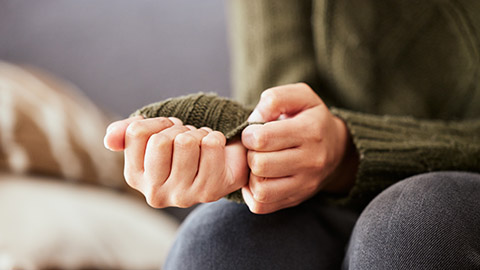
A client is a survivor of childhood trauma. She is a single parent of two children with special needs. She has recently been diagnosed with fibromyalgia and wonders if other conditions also contribute to her problems. She appreciates massage, but her massage therapist is worried they’re not helping enough.
What can we do when we have a crisis of confidence? “I Have a Client Who . . .” host Ruth Werner offers a couple of important reminders about realistic expectations and the benefits that massage can, and sometimes can’t, offer.
Resources: 
Pocket Pathology: /abmp-pocket-pathology-app
Relevant M&B articles
Trauma-Informed Care: Walking the Path of Client-Centered Connection and Collaboration. Available at http://www.massageandbodyworkdigital.com/i/1464088-may-june-2022/72?
Working with Invisible Pain: The Sustainable Practices MTs Can Use to Help Clients with Fibromyalgia. Available at http://www.massageandbodyworkdigital.com/i/1464088-may-june-2022/72?


[music]
0:00:01.5 Ruth Werner: Hello, "I Have a Client Who... " listeners, Ruth Werner here, and I'm so excited to let you know that my library of online self-paced continuing education courses has just expanded. I now have a two-hour ethics course called A Doctor's Note is Not Good Enough, and What is Better? This NCBTMB-approved course goes into why a doctor's permission or approval, or even a prescription, doesn't provide the legal or safety protection you might think it does. Then we look at how to start useful conversations with healthcare providers that will actually get us to safe and effective massage for our clients with complex conditions. Visit my website at ruthwerner.com for more information and to register for A Doctor's Note is Not Good Enough, and What is Better?
[music]
0:01:00.1 RW: Hi, and welcome to "I Have a Client Who... " Pathology Conversations with Ruth Werner, the podcast where I will discuss your real life stories about clients with conditions that are perplexing or confusing. I'm Ruth Werner, author of A Massage Therapist's Guide to Pathology, and I have spent decades studying, writing about and teaching about where massage therapy intersects with diseases and conditions that might limit our clients' health. We almost always have something good to offer even with our most challenged clients, but we need to figure out a way to do that safely, effectively. And within our scope of practice, and sometimes, as we have all learned, that is harder than it looks.
0:01:47.1 RW: Today's story is a tender one, and I want to offer a trigger warning. The client is a survivor of childhood sexual abuse. And although that is not the central topic of this episode, it is relevant. So if this is likely to be more upsetting than useful to you, I completely support you to maybe give this episode a miss.
0:02:09.2 RW: It comes from a massage therapist in Australia who sent me this, he said, "I have a client with a history of sexual abuse from when she was 7 to 11-years-old, which left her with significant internal injuries. She has seen a psychiatrist for over 20 years and is now in her early 40s. She's a single parent of two autistic children, and her body often feels like there's a deep sense of holding on, although she says she receives a great deal of benefit from my regular treatments. After multiple tests, a specialist recently diagnosed her with fibromyalgia, though she doesn't have extreme sensitivity or other markers. She also believes that she has Ehlers-Danlos syndrome and is neuro-divergent, although she hasn't gotten these medically diagnosed. I am a remedial massage therapist with over 35 years experience and have also been trained in Bowen technique and ortho-bionomy. My concern is that I don't know how effective my treatment is when it appears that her overall health is worsening. I feel I should be able to make more of a difference. I realise there are a lot of factors that impact a person's well-being, and if my treatment helps to ease the pressure she's living with, maybe that makes the treatment worthwhile, but is that enough?"
0:03:30.4 RW: Oh, deep breath. There are several directions we could go here. We could talk about this client's history and trauma-informed care, or we could talk about fibromyalgia. Both of these are topics on which I have published recent columns in Massage & Bodywork, so I will put links to these in the show notes. Or we could talk about neuro divergence and Autism Spectrum Disorder, both on behalf of this client's children and the stress that might add to her life, or about her own experiences, even though she hasn't been officially diagnosed. Ehlers-Danlos syndrome, or even just hypermobility, might be another direction we could explore, or we could talk a bit about the real issue here, which is this massage therapist's desire to make things better for this client who has been through so much and who still seems to be in decline.
0:04:26.1 RW: So that's what I want to focus on. Because believe me, when I tell you, contributor, you are not alone. Every good massage therapist I have ever known has gone through cycles when things for their clients don't seem to progress the way they hope and they wonder what they could be doing to be more effective. We all wanna help, we wanna be part of a person's solution and when called upon to make their difficult lives more livable and less difficult.
0:04:57.7 RW: So let's take a step back. Here, we have a massage therapist with over 35 years of experience, they do remedial massage. In Australia and some other places, that's a way of talking about structural or outcome-based massage as opposed to work that might be less clinically focused. They've been educated in two additional skill sets; ortho-bionomy, and for those who don't know, this is a technique that is not technically massage. Other professionals can practice it. It is described as a gentle, non-invasive bodywork therapy that re-educates the body through self-corrective reflexes to find ease and balance. Ortho-bionomy provides relief from chronic and acute pain, and all of that is a quote from the website of an ortho-bionomy practitioner. And this massage therapist also has education in Bowen work, and that's another massage-adjacent skill set. And here's another quote, this one is from a Healthline article that says, "Specifically, Bowen work uses precise and gentle or rolling hand movements. These motions focus on the muscles, tendons, ligaments, along with the fascia and skin around them, and the idea is to reduce pain by stimulating the nervous system."
0:06:15.4 RW: Okay, so it sounds like this person has a lot of experience and well-rounded skills for touching people, but even with all this proficiency and all these skills, their client seems to be getting worse, not better, and that's enough to shake anyone's confidence. And I have so much to say about this.
0:06:36.4 RW: My first instinct is to get super linear and say, "Okay, you talk about how you feel, you should be able to make more of a difference and be sure you're being effective." Well, I'll ask you this, difference in what? Have you talked about setting some specific goals for her that you might be able to work toward together? Maybe she really wants to sleep better, or to be more calm with her kids, or to reduce her pain. But in a situation like this, with the sort of whole person challenges that this client seems to have, I'm gonna say that setting specific measurable goals seems just a bit reductionist. We all know that there are some clients whose situations are more complicated than massage can sort out, and this client with her stress and her fibro and being a single parent of children with challenges, along with challenges of her own, she fits into that category for sure. But I wanna point out a couple of things, things which you, contributor and listeners, probably already know, but sometimes we all need to be reminded. Thing number one, you do no one any favours by making yourself responsible for their well-being. You bring what you bring to the table; compassion, unconditional positive regard, good listening, and please note where this falls in my list of priorities, your skills with massage and touch.
0:08:03.8 RW: Now, did I just say that hands-on skills are not important? I did not. But I maintain that they are less critical than the loving presence that we provide, because if we aren't making people feel safe, if we aren't listening carefully and responding with compassion, then all those wonderful skills won't make anyone better, which is a problematic phrase. Anyway, I mean, really? Do we make people better? I don't think so. I think we create possibilities. But the person doing the healing is the person on the table. And now I'm getting off on a little bit of a different soap box. My point is when someone's improvement in pain or stress or whatever becomes our responsibility, then it also becomes our success or our failure. In a weird way, it actually takes away their agency in order to feed our ego. And it could be said that that is also a pretty significant blurring of boundaries. What are we responsible for? We are responsible to bring our best to every appointment, but what happens after that is quite literally out of our hands.
0:09:21.7 RW: And thing two, our contributor says, "Her body often feels like there's a deep sense of holding on, though she says she receives a great deal of benefit from my regular treatments." Listen to that again. She says she receives a great deal of benefit from your regular treatments. Can you ask her about that sense of holding? Sure, if it will help you to deliver a better session. But maybe she's holding on for reasons that are beyond your reach, and that is 100% okay. She'll let go when she's ready and you can help. In the meantime, let me say it again, she receives a great deal of benefit from your regular treatments. I know we have all had clients who we wish we could serve better. Maybe if we learn that new technique or try that one different stretch or just finally get the timing right on that one move, maybe that will help our client turn the corner and we'll be the hero that started it for them, and I'm here to remind us that keeping our hands-on skills strong and being curious about how to continually improve our work, these are good motivators. But being realistic about expectations and careful about boundaries and loving in our presence, these are important too.
0:10:46.4 RW: Contributor, I just want to say this, you are fantastic. You have this very challenged and challenging client. You're paying close attention to her process, and you want to give her your best, and she deeply appreciates you. She tells you this and she keeps coming back. If you feel you could be doing better, maybe ask her. "What in our sessions do you like best? What do you wish I did less of? What would you like to be able to do that you think I can help you with?" These are the kinds of questions that can help us be in tune with our clients' preferences and goals. But whether they achieve those goals outside of our sessions, that's not up to us. That's up to them.
0:11:33.1 RW: Hey everybody, thanks for listening to "I Have a Client Who... " Pathology Conversations with Ruth Werner. Remember, you can send me your "I Have a Client who... " stories to ihaveaclientwho@abmp.com. That's ihaveaclientwho, all one word, all lowercase, @abmp.com. I can't wait to see what you send me, and I'll see you next time.
[music]